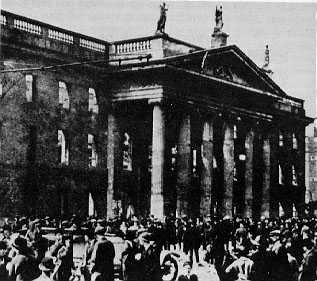An Early Childhood Chapter Ten (Three)
CHAPTER TEN: A MORE DETAILED ACCOUNT OF THE EASTER RISING (PART THREE)
Continued from Chapter 10 Part Two.
An Early Childhood by Paddy Flanagan is a mock, surreal autobiography by a fictional Irish literary figurehead, champion bodhrán player and broadcaster.
At that stage I’d had enough of the Easter Rising but I had to wait in the GPO for another few days while the fighting continued. The fighting actually ended earlier than that, but you understand I have to stretch it out for literary effect, and to build a bit of tension. The post office was ablaze by the time we surrendered. We didn’t quite surrender; we first escaped out of the building and sneaked away before being captured by the Tommies. We were taken to the gaol and we gave our names to the police officer on duty.
“Jimmy Murphy,” I said to the prison officer.
“You’ll have to do better than that,” the incredulous officer responded with a low whistle through his false teeth.
“Paddy Flanagan,” I admitted.
“Ah, come on now,” he said, doubtfully. “That’s just too Irish again!”
“Kundera Serebryakov,” I told him then.
“That’s more like it,” the policeman said, as he marked my moniker down in the arrest book.
We were all of us escorted into a single cell, the door was closed, and we waited.
Shots rang out outside; the first of some thirteen rebel leaders were being executed. I said a brief prayer before a British army officer appeared in the corridor outside the cell.
“Kundera Serebryakov,” he hailed.
There was no response from any of us.
“Kundera Serebryakov,” he repeated.
Again, there was no response.
“Kundera Serebryakov!” he roared, and I stood to my full height and stepped forward.
“I would have come sooner,” I said, “Only I Kundera word you were saying.”
The British army officer groaned and looked very nauseous.
“That was a crap joke,” he said.
I was escorted by the officer out into the reception area of the prison and I was asked by the superintendent what my ethnic origin was. I told him I was of Polish and Russian extraction. The superintendent guffawed loudly, and I added that I was also an American citizen.
“Would you like to join us for a seven-course meal, Mr. Serebryakov?” he asked, as he offered me a cigar.
“No thanks, I’ll just be on my way, if it’s all the same to you,” I said, and I walked out of that particular prison never to be seen or heard from again for some years in Dobbling Village.
I returned to my hometown by train that very night. I heard that the British were on the lookout for an Irish rebel named Homer O’Fire aka Kundera Serebryakov aka Jimmy Murphy F Piddy, aka Paddy F, so I kept my eye on everyone who came into and left the train carriage I was on. There was a young lady with a large baby sitting in the seat opposite me, and as she changed his nappy I had an idea.
“Excouse may madam,” I said in my thickest British regional dialect, “But Ah were just wund’rin’, laaahke, if I could burra a nappa?”
“I’m sorry, I don’t speak German,” the woman replied tersely.
“Could I take a nappy?” I asked, “And I’d be grateful if I could borrow your baby’s rattle as well.” I snatched the items off the table. “And this soother. And the bonnet.” I snatched the other items and quickly exited the carriage and made for the bathroom.
I got changed and soon I was wearing nothing but a nappy on my nether regions and a bonnet on my head with a soother sticking out of my mouth and a rattle in my hand.
The train pulled into my hometown’s only station and I alighted quickly. A regiment of British soldiers awaited the arrival of Paddy Flanagan on the platform. What they saw was a very big baby.
“Halt,” Colonel Gold Bollocks Tiptoft declared, holding a hand in front of me to stop me. “Who are you and what is your business here?”
“My name is Paddy Flanagan Junior,” I said in my best high-pitched baby voice, “And I’m two years old and a half.” I rattled my rattle for good measure.
Colonel Tiptoft’s eyes narrowed.
“Paddy Flanagan Junior?” he said, “Any relation to Paddy Flanagan the Irish patriot?”
“Paddy Flanagan the Irish patriot is my father,” I declared proudly.
“Where is your father now?” Tiptoft asked.
“He got off in Athlone.”
“Oh.” Tiptoft turned to his men. “Well, if Paddy Flanagan can sire a huge two and a half year old child such as yourself, I certainly don’t want to fight him.” He turned to his men. “Right, men, about face, and run!”
“Bye now,” I said as I toddled out of the train station, the English troops scattering.
Assessing my status as an Irish rebel, I decided to put together my band. I wrote a letter to John Fisherman-O’Reilly, insisting that he join me in my hometown, and I ordered too that he bring three further rebels with him. They all of them arrived a week later, and we stayed in a safehouse on the outskirts of the town, planning the bombing of the local army barracks until the arrival outside that very house of Colonel Sir Edward Tiptoft and his men, who’d been “Tiptoft” about me being only a toddler and someone who I wasn’t at all.
Continued in Chapter 11 Part 1.
Continued in Chapter 11 Part 1.









Comments
Post a Comment